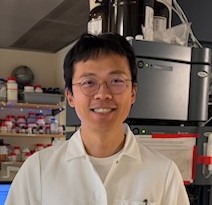There are two key types of cancerous mutations: one that turns on growth signals too strongly, like a car with a stuck accelerator, and the other that turns off safety mechanisms, like a car with broken brakes. While some cancers can be treated with drugs that block overactive growth signals—such as Gleevec for chronic myeloid leukemia—there are currently no effective treatments for cancers caused by the loss of these safety mechanisms, also known as tumor suppressor genes. Notably, mutations in TP53, one of the most common tumor suppressor genes, are abundant in almost all cancers, including breast, lung, and ovarian cancers. Dr. Zheng’s research focuses on reactivating these impaired tumor suppressor genes, such as TP53 and FBXW7, to develop new treatment options for a wider range of cancers and to address resistance to existing therapies.
Pancreatic Cancer
Current Projects
Qinheng Zheng, PhD
Project title: “Chemical rescue of somatic mutations in cancer”
Institution: Harvard Medical School
Award Program: Dale Frey Scientist
Cancer Type: Colorectal, Lung, Pancreatic
Research Area: Chemical Biology







